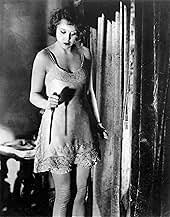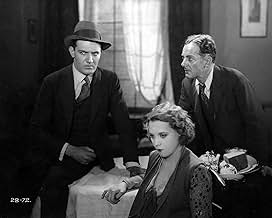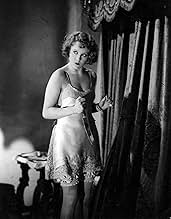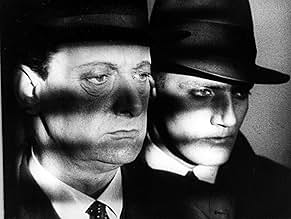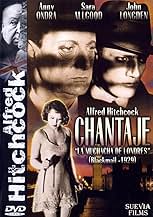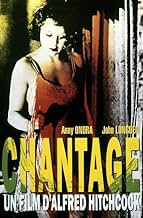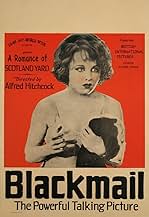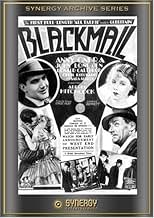An inspector deals with a blackmailer who knows that the lawman's fiancee killed an artist.An inspector deals with a blackmailer who knows that the lawman's fiancee killed an artist.An inspector deals with a blackmailer who knows that the lawman's fiancee killed an artist.
- Awards
- 2 wins total
Ex-Det. Sergt. Bishop
- The Detective Sergeant
- (as Ex-Det. Sergt. Bishop - Late C.I.D. Scotland Yard)
Johnny Ashby
- Boy
- (uncredited)
Joan Barry
- Alice White
- (voice)
- (uncredited)
Johnny Butt
- Sergeant
- (uncredited)
Alfred Hitchcock
- Man on Subway
- (uncredited)
Phyllis Konstam
- Gossiping Neighbour
- (uncredited)
Sam Livesey
- The Chief Inspector (silent version)
- (uncredited)
Phyllis Monkman
- Gossip Woman
- (uncredited)
Percy Parsons
- Crook
- (uncredited)
6.913.2K
1
2
3
4
5
6
7
8
9
10
Featured reviews
Hitchcock's first sound film
One of Hitchcock's early films, it was one of the first films to come out of England with sound during the end of the silent film era. An interesting film, we see several great shots of dolly's with the early staircase scene. Several well shot montages with wonderful dissolves and sound bridges. For 1929, Hitchcock shows the world with the film that he's a talented film maker. A risky scene, the audience gets to watch the main actress of the film undress behind her curtains. While the murder is never seen, the provocative and private scene of her undressing is present. Another interesting note, the main character of the film is the murderer! Throughout the film, the audience judges whether or not she is an innocent murderer or a killer. Hitchcock makes an early name for himself with this film with toying with the audience throughout the suspense of the film.
OK story with great cinematography.
The film incorporates some of German Expressionism which was really obvious in the film. The beginning of the movie itself shows this through the use of lighting and shadows. A recurring theme is the framing of the face with a dark surround, and light shining only on the eyes. This creates a very intense and eerie sort of mood, which consolidate the theme of Expressionism.
The acting is pretty good and both Anny Ondra and John Longden did well. Ondra greatly showed the expressions of a person recently exposed to trauma, and the close-ups of her occupied and fearful expressions emphasize her guilt. Longden first starts off as a pre- occupied character who doesn't pay much attention to Alice, but after the murder he becomes more concerned and does his best to keep her from confessing. I find it interesting that the film goes about different ways to silence Alice. She is never given a chance to tell her story, and hardly gets any input.
The story was average for me, but I guess for that time period it could have been engaging. I felt that it lacked motivation on the part of the blackmailer (Donald Calthrop) and that his character just popped up so suddenly.
The cinematography however was pretty creative. As mentioned before, there was some Expressionistic styles used in the film, and camera placements helped with that. Also, the beginning scene had a really great shot from a mirror that showed a criminal's point of view.
I watched the version of this film with sound recorded, and it was pretty ingenious how sound was synchronized. The voice of Alice is from another actress, and Ondra was miming the words in the film. Though the sound at the beginning of the film is inconsistent and very much like a silent film, it got better throughout the film. Noticeably there was use of ambient noise as well as back shots of characters to eliminate sound synchronization problems. The use of sound to enhance Alice's subjective perception was also a great addition. A obvious example of this is when the neighbour starts gossiping and all Alice hears is "knife blah blah blah knife! blah blah knife!" That was pretty comedic (and annoying after awhile) but could be related to how Alice was hearing things.
Read more movie reviews at: champioangels.wordpress.com
The acting is pretty good and both Anny Ondra and John Longden did well. Ondra greatly showed the expressions of a person recently exposed to trauma, and the close-ups of her occupied and fearful expressions emphasize her guilt. Longden first starts off as a pre- occupied character who doesn't pay much attention to Alice, but after the murder he becomes more concerned and does his best to keep her from confessing. I find it interesting that the film goes about different ways to silence Alice. She is never given a chance to tell her story, and hardly gets any input.
The story was average for me, but I guess for that time period it could have been engaging. I felt that it lacked motivation on the part of the blackmailer (Donald Calthrop) and that his character just popped up so suddenly.
The cinematography however was pretty creative. As mentioned before, there was some Expressionistic styles used in the film, and camera placements helped with that. Also, the beginning scene had a really great shot from a mirror that showed a criminal's point of view.
I watched the version of this film with sound recorded, and it was pretty ingenious how sound was synchronized. The voice of Alice is from another actress, and Ondra was miming the words in the film. Though the sound at the beginning of the film is inconsistent and very much like a silent film, it got better throughout the film. Noticeably there was use of ambient noise as well as back shots of characters to eliminate sound synchronization problems. The use of sound to enhance Alice's subjective perception was also a great addition. A obvious example of this is when the neighbour starts gossiping and all Alice hears is "knife blah blah blah knife! blah blah knife!" That was pretty comedic (and annoying after awhile) but could be related to how Alice was hearing things.
Read more movie reviews at: champioangels.wordpress.com
Hitchcock's guilty woman
A common motif in Alfred Hitchcock's movies is the guilty woman: "Blackmail", "Psycho" and "The Birds" are all prime examples. In "Blackmail", Alice White (Anny Ondra) goes home with an artist one night and he tries to rape her. She murders him, and from then on everything reminds her of it. The jester painting appears to be looking at her (or she at it?), a billboard looks like a knife, and a woman keeps uttering the word knife. But in the end, everything blows up in Alice's face.
Hitch was certainly showing his chops here. The camera angles, scenery, and other such things all combined to make what we would expect in a Hitchcock movie. I try to imagine being a moviegoer in 1929 watching "Blackmail" for the first time, wondering what Hitchcock's subsequent work would be like.
Hitch was certainly showing his chops here. The camera angles, scenery, and other such things all combined to make what we would expect in a Hitchcock movie. I try to imagine being a moviegoer in 1929 watching "Blackmail" for the first time, wondering what Hitchcock's subsequent work would be like.
Unquestionably Hitchcock
Britain's first talkie, the 1929 "Blackmail," is directed by Alfred Hitchock, and even back then, it has many of his touches. The stars are Anny Ondra, Cyril Ritchard, John Longden, and Sara Allgood.
A young woman (Ondra) two-times her Scotland Yard inspector boyfriend (Longden) and goes out with an artist (Ritchard). Things get rough in his apartment, and he forces himself on her.
She kills him (a la Dial M for Murder). Her boyfriend finds her glove in the apartment and realizes she did it; the other glove was found by a criminal hanging around the artist's apartment building, and he decides to blackmail the inspector.
Hitchcock more than appears in this film; he has a bit with a little boy on a subway. The film is strange in that the beginning is silent with no title cards. Then suddenly, there is sound.
It moves quite slowly, with not much in the way of action. The story builds slowly, and the scene in the artist's apartment is quite long before anything happens.
Nevertheless, the Hitchcock touches are there. A pivotal scene happens at the British Museum - Hitchcock's upheaval in familiar places. And in the jail scene, there's a sound the director often described as being terrifying in his childhood when his father had the local police teach him a lesson - the jail door closing.
The very pretty Ondra, wife of boxer Max Schmelling, is dubbed here. Ritchard in 1929 is not recognizable as Captain Hook.
Worth seeing - it's early Hitchcock and it's an 80-year-old movie. Mind-boggling.
A young woman (Ondra) two-times her Scotland Yard inspector boyfriend (Longden) and goes out with an artist (Ritchard). Things get rough in his apartment, and he forces himself on her.
She kills him (a la Dial M for Murder). Her boyfriend finds her glove in the apartment and realizes she did it; the other glove was found by a criminal hanging around the artist's apartment building, and he decides to blackmail the inspector.
Hitchcock more than appears in this film; he has a bit with a little boy on a subway. The film is strange in that the beginning is silent with no title cards. Then suddenly, there is sound.
It moves quite slowly, with not much in the way of action. The story builds slowly, and the scene in the artist's apartment is quite long before anything happens.
Nevertheless, the Hitchcock touches are there. A pivotal scene happens at the British Museum - Hitchcock's upheaval in familiar places. And in the jail scene, there's a sound the director often described as being terrifying in his childhood when his father had the local police teach him a lesson - the jail door closing.
The very pretty Ondra, wife of boxer Max Schmelling, is dubbed here. Ritchard in 1929 is not recognizable as Captain Hook.
Worth seeing - it's early Hitchcock and it's an 80-year-old movie. Mind-boggling.
Not a disappointment at all
I have seen most of Alfred Hitchcock's films, silent and talking, and was saving this one for a special occasion. It was really quite good and although over-rated despite being cited so often (along with Mamoulian's "Applause") as a successful example of the transition between the silents and talkies in all the references I've consulted, it still has some distinct good qualities of its own. Annie Ondra is an excellent silent actress and this among several other films proves it. Her accent was very strong, of course, and employing Joan Barry to "lip-synch" was genial. Francois Truffaut's interviews with Hitchcock about working with Ms Ondra were enough to stimulate anyone's appetite to see her (and to hear Joan Barry) at work. The music - at least in the beginning - is excessively burdensome and "busy" and frankly irritating. However, when the characters finally began dialogue, it calmed down considerably and actually worked out well until the ending. We're seeing a hybrid here: a talkie and a part-talkie. When the talking itself finally happens, the characters aren't even facing the camera but are photographed from behind! This is the famous Hitchcock we know and love in the heat of action. The view of the staircase is very Hitchockian as in "Vertigo" or "Psycho" as well as the chase in a public monument (North by Northwest" comes to mind). Yes, the director made the move to talking pictures quite fluently and fluidly. One should keep in mind, too, that the film had already been completed as a silent before being converted into a talkie! All the more to admire...
Curtis Stotlar
Curtis Stotlar
Did you know
- TriviaMuch of the filming originally was shot silently. When sound became available during the course of shooting, Sir Alfred Hitchcock reshot certain scenes with sound, thus making it his first talkie. There was one complication with this change, however. Leading lady Anny Ondra had a thick Czech accent which was inappropriate for her character, Alice White. Joan Barry was chosen to provide a different voice for her, but post-production dubbing technology did not exist then. The solution was for Barry to stand just out of shot and read Alice's lines into a microphone as Ondra mouthed them in front of the camera. [This is a major plot point of Singin' in the Rain (1952), which is set in the era of movie studios moving from silent pictures to talkies.] This generally is acknowledged as the first instance of one actress' voice being dubbed by another, even though the word "dub" is technologically inappropriate in this case.
- GoofsAt about 0:24:30 when Crewe (Cyril Ritchard) is talking to Alice (Anny Ondra), he calls her "Anny" before correcting himself.
- Quotes
Alice White: You and your Scotland Yard! If it weren't for Edgar Wallace, no one would ever have heard of it.
- Alternate versionsOriginally filmed as a silent movie, running 75 minutes; Hitchcock later added newly shot scenes and had other existing footage dubbed to create a talkie version, running 86 minutes.
- ConnectionsEdited into Der Zinker (1931)
- SoundtracksMiss Up-to-Date
(1929) (uncredited)
Words by Frank Eyton and music by Billy Mayerl
Performed by Cyril Ritchard
Details
Box office
- Gross worldwide
- $838
- Runtime
- 1h 25m(85 min)
- Color
- Aspect ratio
- 1.20 : 1
Contribute to this page
Suggest an edit or add missing content

